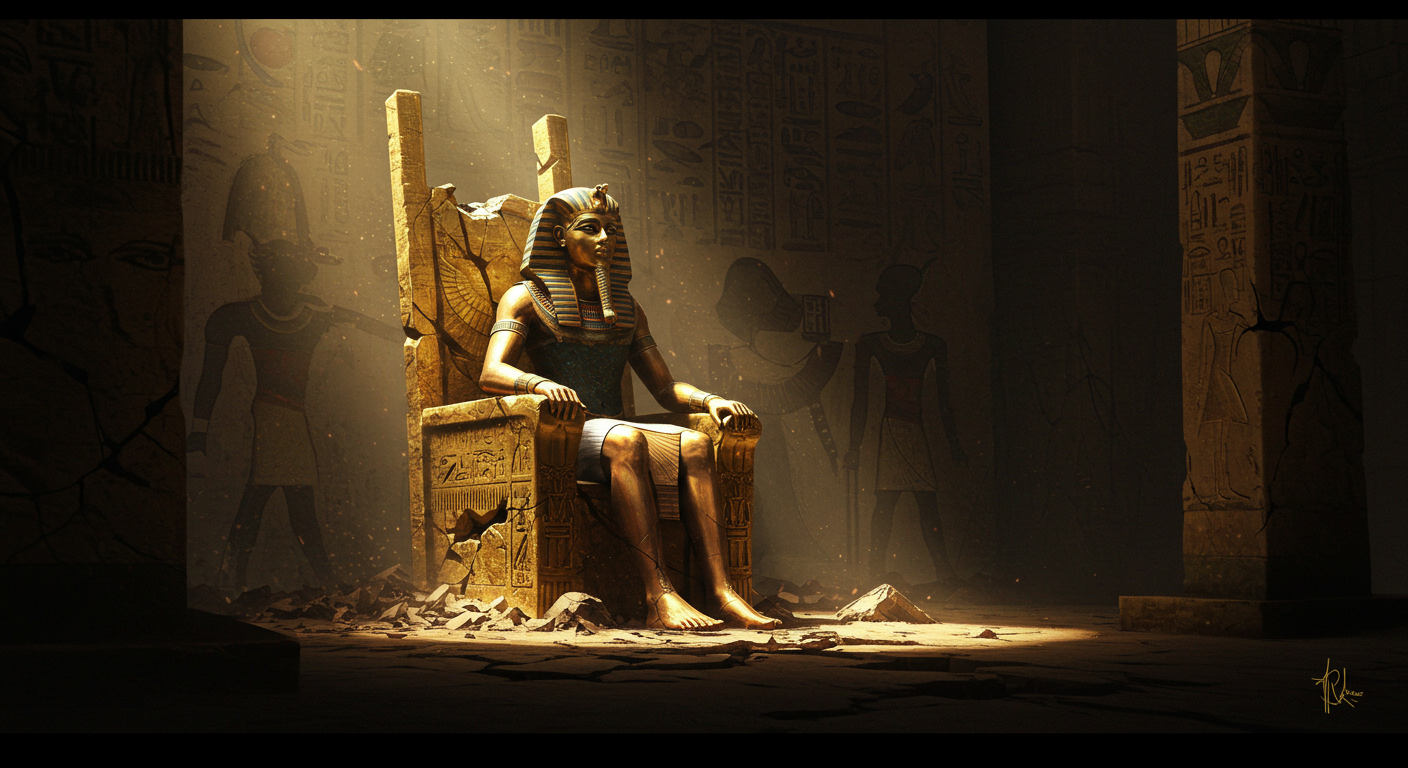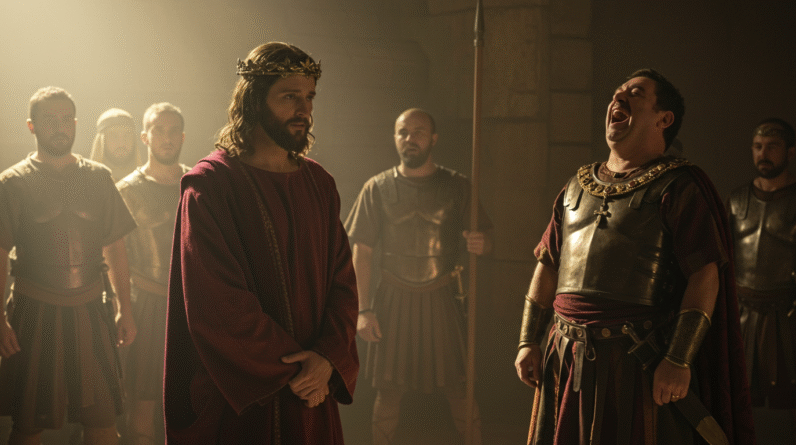Lessons From Pharaoh: When Power Becomes Destruction
Hello there, dear reader! Gather around as we embark on a historical journey, taking a closer look at the story of the Pharaoh of Exodus. This captivating tale, rich with intrigue and moral lessons, has transcended time, offering a mirror through which we can reflect on contemporary issues. Together, we will examine the consequences of absolute power and the importance of humility. So, grab a cozy spot, and let’s dive in!
The Ancient World of Pharaoh
Imagine, if you will, the dizzying heights of ancient Egypt. The vast pyramids touching the sky, a culture rich in art and innovation, and at its helm, the Pharaoh—a god-king who wielded unimaginable power. The Pharaoh of Exodus is a figure etched into our collective consciousness, emblematic of the heights and pitfalls of authority. While ancient Egypt fascinates many of us with its grandeur, it also serves as a backdrop for one of history’s most compelling narratives about power gone awry.
The Pharaoh of Exodus is famously known as the ruler who ensnared the Israelites in bondage—a tale documented in the Bible’s Book of Exodus. This Pharaoh’s story is less about the architectural wonders of his reign and more about the ethical decline that ensued as a result of his unrelenting desire to maintain control. As we peel back the layers of this historical drama, we witness a potent reminder of the dangers lurking when power is misused.
A Cautionary Tale of Pride and Fall
Hold steady as we traverse this tale of caution. The Pharaoh of Exodus serves as a stark embodiment of pride that ultimately leads to a cataclysmic downfall. His grip on the Israelites was tight, refusing to let them go even when faced with dire consequences. In his heart, the stubbornness festered like a wound, and his arrogance became his undoing.
Each time Moses approached Pharaoh, urging with, “Let my people go,” there was resistance that bloomed from a place of egotism. This obstinance laid the groundwork for a sequence of catastrophic plagues that engulfed Egypt in despair, outlined in the Book of Exodus, from Exodus 7:14-12:30. Throughout these chapters, you’ll find not just an account of historical plight but a reflective lesson about what happens when respect for divine authority takes a back seat to human hubris.
Divine Intervention and Consequences
Travel with me now into the realm of divine intervention. The storyline is clear: God sent Moses not just to liberate His people but also to challenge the Pharaoh of Exodus— an example of how unchecked power can face divine retribution. God’s method of communication was strikingly loud and clear, symbolized most famously by the ten plagues.
As each plague was unleashed—frogs, gnats, darkness, and more—the Pharaoh’s resolve seemed to harden further. His refusal to recognize a power greater than himself steered Egypt into turbulence, as the plagues represented a divine manifestation of consequences that arise when power is abused and humility is ignored.
The Human Cost of Absolute Power
Don’t scroll past this; pause and contemplate the real devastation—beyond palaces and politics—is the human cost of absolute power. The Hebrew slaves toiled in harsh conditions, their life stories woven with the thread of oppression by the Pharaoh of Exodus. Their cries echoed through every brick laid, resonating with sufferings that are heart-rending when you deeply consider them.
The human tragedy goes beyond those directly under Pharaoh’s rule. Even Egyptian society at large paid a heavy toll. The catastrophes brought by the plagues impacted all walks of life, speaking to the broader theme that when leadership fails in humility, everyone suffers.
Pharaoh’s Hard Heart
Join me in contemplating the metaphorical and literal implications of Pharaoh’s “hard heart.” Often referenced as a key element in the narrative, the hardness of the Pharaoh’s heart is not just a physical metaphor but a spiritual and emotional state. As indicated throughout Exodus 8:15, his heart was hardened again and again.
Why does this matter? Well, dear reader, it’s a reminder that the absence of empathy and understanding can lead a leader—and a nation—into ruin. Pharaoh’s inability to soften his heart—his steadfast refusal to yield—blocked the path to redemption until it was tragically too late.

Leadership Lessons from the Pharaoh of Exodus
Are you curious about real-life applications? The Pharaoh of Exodus leaves us with profound leadership lessons to unpack. Imagine the devastation that could have been avoided with a different approach—one rooted in wisdom, humility, and acknowledgment of broader forces beyond oneself.
In any leadership position, whether in our personal lives or broader societal contexts, the tale of Pharaoh encourages reflection on the importance of flexibility and humility. Leaders must recognize their limitations, embrace empathy, and listen, which the Pharaoh failed to do, much to the detriment of his kingdom.
The Importance of Humility Before God
Let’s cast light on a central tenet of this narrative—the importance of humility before God. The Pharaoh of Exodus serves as a powerful reminder that recognizing a higher power can bring balance to our lives. The refusal to acknowledge God and the relentless pursuit of control demonstrated by the Pharaoh are stark warnings of how easily greatness can crumble under the weight of our egos.
True humility involves recognizing our place in the universe. It’s about understanding that power, while influential, is not infallible. This humility is not just an act of morality but a safeguard against the isolation and destruction that comes with an overestimation of our capabilities.
Echoes Through Time
Dear reader, consider now how the echoes of this tale reverberate through time. The lessons from the Pharaoh of Exodus aren’t locked away in the pages of an ancient text; they pulsate in the heartbeats of history and into our modern world. From tyrants to benevolent leaders, history is peppered with variations of this narrative.
Every individual who wields power—from political leaders to parents—can glean insights from this tale. The story stands as a testament to history’s powerful ability to teach us, urging us to heed the lessons from those who came before us, like the Pharaoh of Exodus.
Designing a Compelling Visual Message
Visual learners, take note! Designing a compelling message that highlights the dangers of abusing power, as seen in Pharaoh’s story, can be an engaging way to communicate this potent narrative. Imagine a thought-provoking poster, where the imagery of ancient Egypt merges with the poignant message: “Pride Precedes a Fall.” This visual representation can serve as a gentle nudge, provoking reflection about humility and power.
Consider incorporating symbolic elements such as broken chains, a hardened heart, or the shadow of the pyramids, to drive home the message. Art, after all, often conveys what words cannot, tapping into our deepest understandings and intuitions.
Harnessing the Past for a Better Future
Here we stand at the crossroads of past and future, pondering how to harness the lessons from Pharaoh’s story to forge better paths forward. In today’s rapidly changing world, where power dynamics frequently shift and evolve, the timeless truth of humility remains steadfast. Pharaoh’s Egypt is a vivid chapter in humanity’s collective history book—one that beckons us to learn and grow from its pages.
By internalizing the lessons from the Pharaoh of Exodus, we can navigate power structures and personal relationships more effectively. Whether it’s balancing authority with empathy in the workplace or practicing compassion in our realms, the wisdom of this ancient tale continues to serve as an invaluable guide.
The Call to Reflection and Action
In conclusion, as you sit with these stories and reflections, I invite you to see the Pharaoh of Exodus not just as a distant figure in ancient times, but as a whispering reminder in our ears today, urging each of us to wield power with care and humility. Think about your sphere of influence and consider how the lessons from this tale might resonate in your life.
Be inspired to take this newfound understanding and integrate it into your day-to-day interactions. Let history’s echoes spur you into action, fostering a world where leadership is characterized by wisdom and power is wielded with accountability.
Explore More
For further reading and encouragement, check out these posts:
👉 7 Bible Verses About Faith in Hard Times
👉 Job’s Faith: What We Can Learn From His Trials
👉 How To Trust God When Everything Falls Apart
👉 Why God Allows Suffering – A Biblical Perspective
👉 Faith Over Fear: How To Stand Strong In Uncertain Seasons
👉 How To Encourage Someone Struggling With Their Faith
👉 5 Prayers for Strength When You’re Feeling Weak

📘 Jesus and the Woman Caught in Adultery – Grace and Mercy Over Judgement
A powerful retelling of John 8:1-11. This book brings to life the depth of forgiveness, mercy, and God’s unwavering love.
👉 Check it now on Amazon
As a ClickBank Affiliate, I earn from qualifying purchases.
Acknowledgment: All Bible verses referenced in this article were accessed via Bible Gateway (or Bible Hub).
“Want to explore more? Check out our latest post on Why Jesus? and discover the life-changing truth of the Gospel!”








